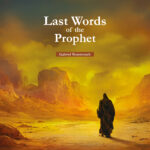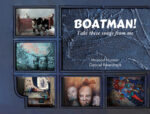-
Last Words of the Prophet
₹800.00Author: Gabriel Rosenstock
Kahlil Gibran’s The Prophet (1923) is one of the golden books of all time. It rocketed to fame and is read by millions —everyone from hippie kids searching for meaning and solace in a war-torn world to celebrity figures like Marilyn Monroe, who would open its pages during filming breaks.
The Prophet has never been out of print and has been translated into over a hundred languages, including an Irish-language version by Gabriel Rosenstock. Having first read the The Prophet as a teenager, Rosenstock was deeply moved by Gibran’s mystic arrows that pierce the heart yet also flummoxed by certain passages.
Inspired to transcreate it into Irish, Rosenstock’s task led him to write a sequel —a homage to Gibran. A poetic speculation, perhaps; let the reader judge if it strays too far!Interested readers may write to us at mup@manipal.edu about purchasing the book.
-
Boatman! – Take these songs from me
₹1,800.00Authors: Gabriel Rosenstock, Masood Hussain
Boatman! take these songs from me is a compilation of mesmerizing artwork coupled with tankas. A tanka is an ancient Japanese form of poetry written in short five-line verses, with a total of 31 syllables. The painted reliefs are an aesthetic creation by Masood Hussain, who bases his artwork in this book on Mirza Ghalib’s couplets on the inevitability of grief. These works explore human suffering, the melancholy of life, and the visceral struggle against oppression..
These themes are contextualized in the poems, written by Gabriel Rosenstock, which speak of love, sacrifice, longing, and freedom. His poems also comprise an interesting orthographical inversion of the capital Y in ‘You’ and the lower case ‘i’, which subjectifies the reading experience through an outward focal lens, reflected in the play of light and hue in the paintings. The bilingual poems in Irish and English capture the essence of the paintings, ferrying the collection across to the reader. This poetically painted coffee table book is a ‘Boatman’ unto itself.Interested readers may write to us at mup@manipal.edu about purchasing the book.


